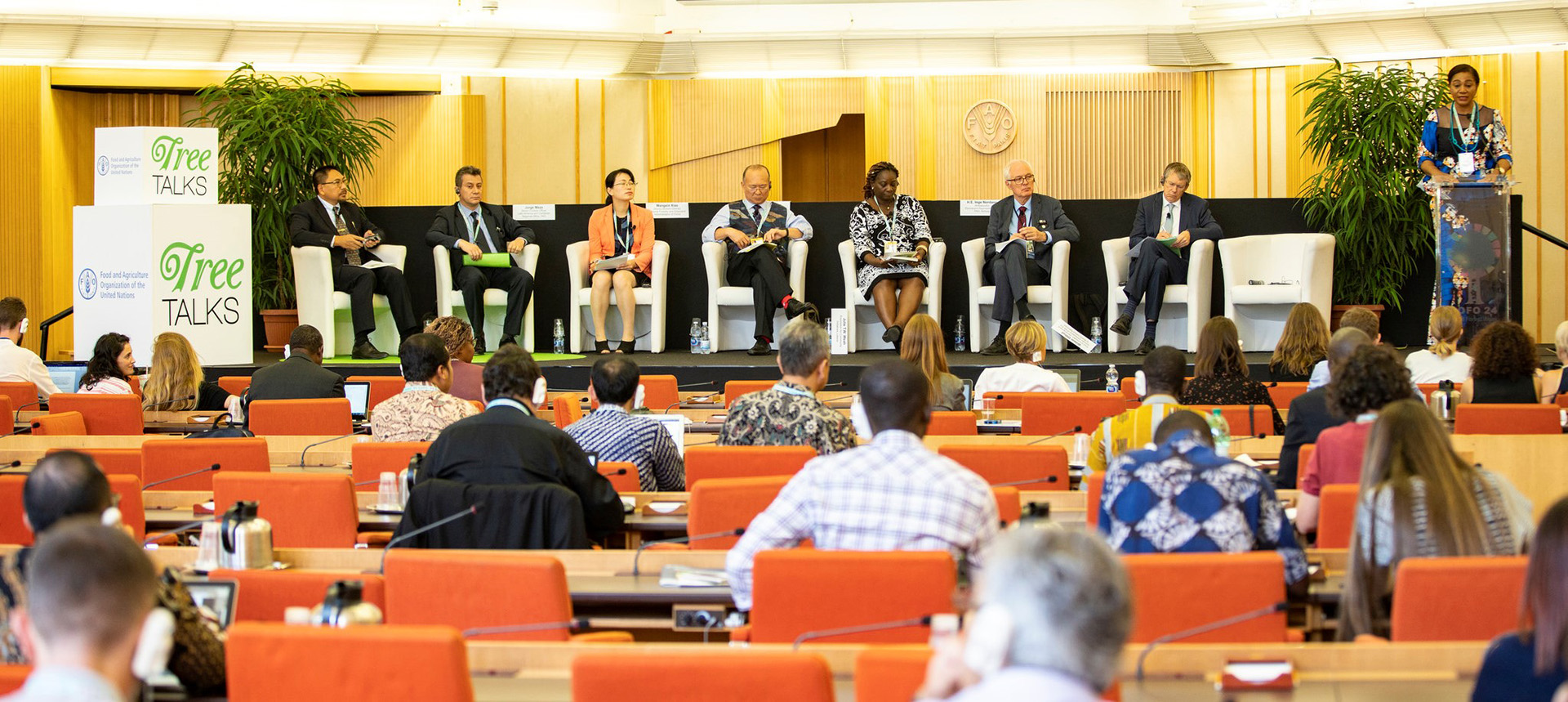A growing movement to halt deforestation and forest degradation has put forest governance at the center of these efforts. Governance, a cross-cutting theme, is at the heart of achieving Nationally Determined Contributions under the Paris Agreement as well as the Sustainable Development Goals, particularly in assuring rural economic growth and poverty reduction. The United Nations Programme on Reducing Emissions from Deforestation and Forest Degradation (UN-REDD) and FAO-EU Forest Law Enforcement, Governance and Trade (FLEGT) Programmes have different mandates and areas of focus, yet they are in a unique position to work together to strengthen governance in the forest sector, clarifying land tenure, facilitating stakeholder engagement, increasing transparency and addressing illegal logging as a driver of deforestation and forest degradation. At the same time, they have the potential to promote sustainable production and consumption, and improve local livelihoods.
As the team leaders of the FAO-EU FLEGT Programme and FAO’s REDD+ Programme, we have watched an organic process of collaboration start at the country level, with these different initiatives working together to face common causes of deforestation and forest degradation, and improve governance. Some examples of how these synergies have transformed into structural collaboration can be seen in Colombia, Côte d’Ivoire and Viet Nam.
The FAO-EU FLEGT Programme in Colombia has been designed in alignment with the national REDD+ strategy, which has been developed with support from UN-REDD. Both programmes support the development of a community forestry model, and the strengthening of forest monitoring and traceability systems to increase the efficiency of timber traceability. A common thread in all of these areas is forest governance. In addition, FAO, within the framework of the two programmes’ implementation, has used its convening role as a bridge between different branches of government, the private sector and civil society to coordinate action and support.
In Côte d’Ivoire, UN-REDD and FAO-EU FLEGT programmes have jointly supported the Government in developing and implementing decrees for the Forest Code that address holistic governance issues related to both timber legality and deforestation and degradation challenges. In Viet Nam, FAO has supported the Government to develop five provincial REDD+ action plans and initiate implementation. Technical assistance has strengthened the capacities of smallholders, state-owned forest companies, and forest management boards to pursue sustainable forest management and certification, particularly for plantation forests. FAO has also assisted small- and medium-sized enterprises and smallholders to meet timber legality requirements.

On 20 July 2018, the 6th World Forest Week was held in conjunction with the 24th Session of the Committee on Forestry (COFO) -- the FAO statutory body which brings together heads of forest services and senior government officials to identify emerging policy and technical issues and to seek solutions. During this week, a dialogue was held that hosted representatives from government and civil society to explore the ongoing partnership-building effort between FLEGT and REDD+ initiatives at the country level, which are implemented through the UN-REDD and FAO-EU FLEGT programmes. Representatives from Indonesia, the Republic of Congo, Latin America and the Caribbean region, plus a community organization from Liberia and representatives from the European Union and Norway all shared their unique experiences.
From this lively discussion, we can see four clear action areas emerge moving forward:
-
Enhancement of inclusive stakeholder dialogue, and empowering communities to exercise rights to resources: FLEGT and REDD+ have established successful models of multi-stakeholder participation, and these have served as tools to open a space for inclusive dialogue between stakeholders (forest dependent communities, private sector, governments and civil society) that has resulted in real change. When this dialogue does not work, it is important that there are governance systems, which help traditional forest owners to exercise their rights to forest resources (as evidenced by the need for legal reforms and local governance mechanisms mentioned by several speakers during the event). This dialogue could be extended to include agriculture (both industry and local farmers unions and other small-holders and actors) as well as other sectors that have an impact on forests.
-
Improved cross-sectoral land use planning, which involves forestry, agriculture, and other land uses that drive deforestation: The gap between understanding and taking common actions to improve forest governance, land governance and agricultural-sector governance needs to be addressed. It is likely that improved governance and land-use planning can only take place through further cross-sectoral dialogue that involves all sectors and actors. Forest and land-use governance and planning should serve as a key cornerstone for any successful strategy to halt deforestation and degradation.
-
Strengthening the enabling environment for sustainable investment: The need for incentives for new economic models was noted. While leveraging improved governance and halting deforestation are important, REDD+ and FLEGT can and should serve a wider purpose and provide incentives for investment in forests. Investment in forests will increase their value and relevance in successfully contributing to poverty reduction and rural employment.
-
Increased coordination between efforts to address governance: While there are many localized joint efforts to address governance within these programmes, further exploration of synergies through REDD+ strategies would be welcome and useful in developing a more systematic approach to address forest and land governance issues.
As a take-away, we would like to underline two main outcomes of the recent dialogue during World Forest Week:
-
Achieving climate and development goals will not be possible without strong institutions and good governance that enable coordinated action across sectors.
-
Country commitments to REDD+ and FLEGT present important opportunities for cross-cutting actions to address forest loss, strengthen forest governance, and mitigate climate change.
We believe that working together collectively to strengthen forest governance will benefit not just efforts at reducing deforestation and forest degradation, and improving forest legality, but will also help to build the foundation needed to achieve the Sustainable Development Goals.




